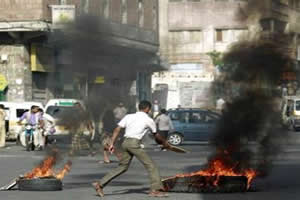Yemeni planes bomb southern cities

foreign intervention to help avert a regional security crisis.
Protests demanding an end to President Ali Abdullah Saleh’s three-decade rule continue to paralyse the country. He clings to power despite an assassination attempt that forced him to seek treatment in Saudi Arabia, leaving the country in limbo.
Islamist militants suspected of ties to al Qaeda have seized two cities in the southern province of Abyan, including its capital Zinjibar, forcing tens of thousands of Yemenis to flee.
Western powers and neighbouring oil giant Saudi Arabia fear al Qaeda is exploiting a growing security vacuum in the country, from which it has already launched failed attacks against the United States and Riyadh.
A top general who defected from Saleh and joined protesters in March told broadcaster CNN International that the political standoff in Yemen, a country awash in weapons, put the impoverished country and its oil-rich Gulf neighbours at risk.
“We need the intervention of our friends and quickly because propagandas might take place against the country. It could put the country into a severe security stalemate. The entire region will be affected security-wise,” said General Ali Mohsen.
Washington and Riyadh have failed to pressure Saleh into signing a Gulf Arab initiative for a power transfer, which he has backed out of three times at the last minute.
Saleh’s opponents have accused him of letting his forces ease up on Islamist militants in the south, where violence is rising, to stoke fears in the international community that only he stands in the way of a militant takeover. Despite Yemen’s plans last week to step up military operations in the south, it has yet to loosen the militants’ grip on several sites in Abyan. Militants took a makeshift military base last week and have surrounded another base.
Yemen ramped up air raids in Abyan yesterday, killing four gunmen in the militant-held city of Jaar, but local officials complain the raids often strike areas with no militant activity. A raid on the house of a top parliamentarian on the outskirts of Zinjibar killed four of his cousins and injured six civilians in what appeared to be a botched operation.
The flight of thousands of people from violence in the south, as well as severe food and water shortages, have raised the spectre of a humanitarian crisis in a country already on the verge of collapse.
An official told a UN delegation visiting Yemen on Monday that some 54 000 people had fled Abyan to neighbouring Aden, near the mouth of a key shipping lane through which around 3 million barrels of oil pass daily.
Underscoring fears that the strategic route could be in jeopardy, maritime sources yesterday told Reuters Somali pirates had exploited the country’s political turmoil to use the remote island of Socotra as a refuelling hub, enabling the seaborne gangs to stay at sea longer.
Somali pirates, making millions of dollars in ship ransoms, have become increasingly violent.
Tens of thousands of protesters have camped out in Yemen’s main cities for six months demanding Saleh’s ouster, but violence has ebbed since Saleh was hospitalised in Riyadh.
General Ali Mohsen, in his CNN interview, said the country was in a deadlock that he feared could tip it into civil war. In a move that could raise tensions with demonstrators, police arrested two opposition leaders at the airport yesterday. One, the head of a Shi’ite Muslim opposition group, was released but there has been no word on the second, the leader of an influential youth protest movement. – Reuters.









Comments